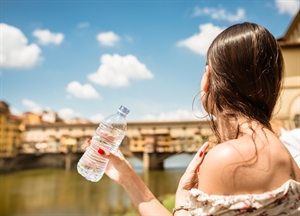Did you know that you can be exposed to some unpleasant diseases in everyday activities like drinking, swimming and washing? Most people who catch a water-borne disease get over it quickly, but in some cases these illnesses can run on for weeks or months or leave patients with lasting effects. Some of them can even be fatal.
Water-borne diseases are caused by viruses, bacteria and parasites found in fresh water. Some examples include: campylobacteriosis, cholera, Salmonella poisoning and typhoid, which are all caused by bacteria. Viruses such as those which cause polio, hepatitis A and hepatitis E, are also found in fresh water. And some diseases are caused by parasites like cryptosporidiosis, schistosomiasis and giardia.
There are few easy habits you can cultivate that should help you to reduce your chances of exposure – or, if the worst happens and you are exposed, help you to get over any illness quickly.
1. Learn about safe water
We take it for granted in Canada that we can just turn on a tap and drink the water – but in many regions the tap water needs to be treated before it is safe to drink; or you may find yourself somewhere that has no piped water at all. Check the standards of tap water at your destination with Is the Water Safe to Drink and ask your travel health advisor for the most up to date information.
2. Where is your safe water coming from?
If you think you may have problems sourcing safe water at your destination you need to plan ahead. Bring a water bottle so that you can carry your own water on day trips.
Factory-sealed bottled water is safe to drink, but water is heavy to carry, and plastic bottles may put pressure on local waste disposal services.
Think about purification techniques: these will allow you to draw on local water sources, or even use river and stream water. Methods include:
- boiling
- halogens
- salt electrolysis
- filtration
- UV radiation
The Government of Canada has some water treatment advice for travellers. You can find water treatment equipment in outdoor shops.
3. Dental care
You should use safe water for cleaning your teeth. Keep your mouth shut while showering, too!
4. Ice is not a good idea
There can be water-borne pathogens in ice cubes because freezing is not a reliable way to kill microorganisms. If you’ve made your own ice with bottled or treated water, you know it’s safe – but you cannot say the same about the ice sitting in the ice bucket on the bar. It is better to have your drink at room temperature, even if that is warmer that you’d like! Bottled drinks taken from the fridge are safe, though.
5. Where are you swimming?
It is possible to contract several unpleasant illnesses – in particular giardia and schistosomiasis – while swimming in fresh water. Ask local people where you can swim – or stick to chlorinated swimming pools.
6. Get vaccinated against water-borne diseases
With the best will in the world, it is very hard to avoid being exposed to water-borne pathogens, but you can support your immune system by getting vaccinated against water-borne diseases. For example, there are shots for typhoid, hepatitis A, cholera and polio. Make an appointment at one of our travel clinics in Edmonton, Fort McMurray, Medicine Hat, Okotoks, Red Deer and Calgary to find out more.

